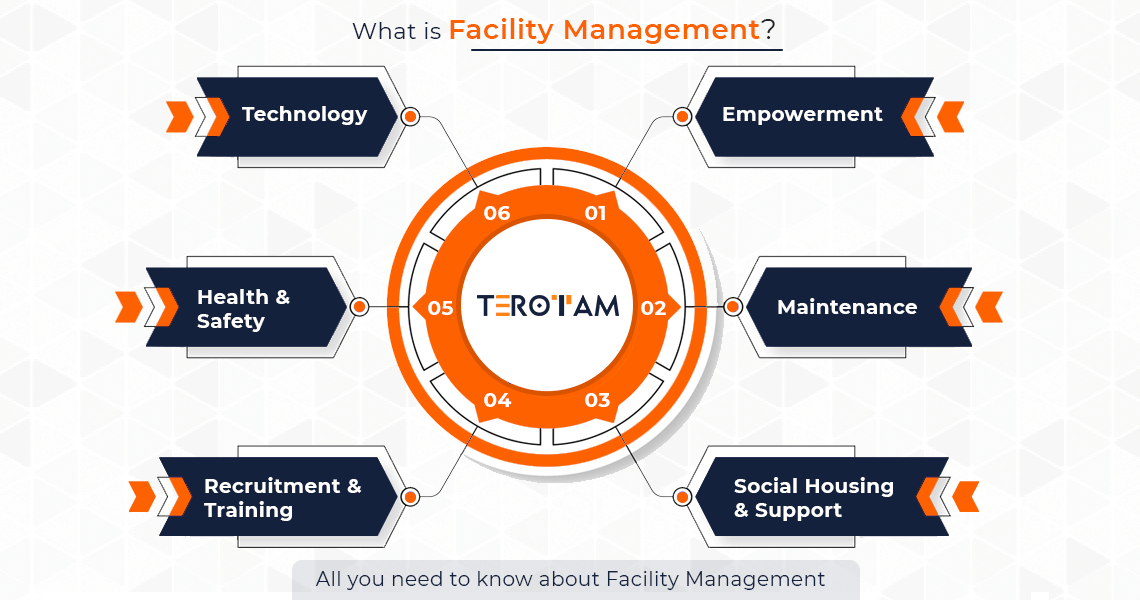The Duty of Facility Management in Sustainable Operations
The Duty of Facility Management in Sustainable Operations
Blog Article
Key Patterns Forming the Future of Facility Management in 2024
As we look in advance to 2024, the landscape of facility management is positioned for substantial change, driven by several key fads. The combination of wise building modern technologies and a change towards data-driven decision-making assurance to boost operational performance while focusing on sustainability in practice.
Smart Structure Technologies

Smart building innovations incorporate a wide range of systems, consisting of smart lights, HVAC controls, and safety and security systems. By integrating these systems, facility managers can keep an eye on and readjust criteria in real-time, bring about significant reductions in power waste and functional costs. For instance, clever sensing units can detect occupancy levels and readjust lights and temperature level accordingly, ensuring that energy is only made use of when necessary.
Furthermore, these innovations facilitate enhanced information collection, enabling companies to track usage patterns and recognize possibilities for additional enhancements. The implementation of clever structure innovations not only adds to sustainability objectives however also develops much healthier work environments that can enhance worker efficiency and complete satisfaction.
As we move right into 2024, the adoption of clever structure technologies will likely increase, showing a broader change towards even more intelligent, responsive, and lasting facility monitoring methods.
Data-Driven Choice Making
Progressively, organizations are leveraging data-driven choice making to enhance center management techniques. By taking advantage of data analytics, center supervisors can obtain actionable insights that significantly enhance operational effectiveness and resource allowance. The integration of sophisticated technologies, such as IoT sensing units and real-time monitoring systems, allows the collection of vast amounts of information on building performance, tenancy rates, and power consumption.
This wide range of information enables center managers to recognize trends, anticipate upkeep needs, and proactively address problems prior to they escalate. For instance, anticipating analytics can anticipate equipment failures, lowering downtime and repair work expenses. Additionally, data visualization devices promote better communication among stakeholders, making sure that educated decisions are made collaboratively.
Furthermore, data-driven techniques boost critical preparation by enabling facility managers to evaluate the efficiency of present techniques and make educated selections pertaining to financial investments in technology or infrastructure. As organizations increasingly prioritize operational excellence, data-driven decision production is positioned to come to be a keystone of effective center monitoring methods in 2024 and past. Inevitably, the capacity to utilize information successfully will equip organizations to produce much more efficient, productive, and resilient centers.
Sustainability and Environment-friendly Practices
The focus on data-driven choice making naturally aligns with the growing concentrate on sustainability and environment-friendly methods within facility management. As companies significantly focus on ecological duty, center managers are leveraging analytics to maximize source usage, decrease waste, and minimize carbon impacts. This critical technique allows the integration of energy-efficient systems, such as LED lights, clever a/c controls, and sustainable energy resources into center operations.
Moreover, the execution of lasting practices expands beyond power usage. Center supervisors are adopting redirected here eco-friendly products and promoting reusing campaigns to produce a round economic climate within their centers. This not only boosts the environmental account of the organization yet also cultivates a culture of sustainability amongst employees.
Compliance with ecological policies is an additional important aspect driving the adoption of environment-friendly methods. By making use of data analytics, facility supervisors can monitor conformity metrics and recognize areas for renovation, ensuring adherence to international and regional sustainability criteria.
Hybrid Work Designs
A substantial shift towards crossbreed job models is reshaping the landscape of center monitoring in 2024. This paradigm integrates in-office and remote job, necessitating a reevaluation of area application, resource allotment, and staff member engagement methods. Organizations are significantly recognizing the significance of versatile offices that accommodate diverse needs and preferences.
Facility supervisors must adjust by executing flexible workplace styles that sustain collective efforts while supplying areas for concentrated job. This includes the assimilation of modern technology to assist in seamless interaction and cooperation among in-office and remote workers. Smart structure options, geared up with sensing units and analytics, enable for real-time monitoring of area usage, allowing companies to optimize their settings successfully.
Moreover, crossbreed job versions stress the demand for reliable center management that prioritizes worker experience. In essence, the hybrid work version is revolutionizing facility administration, motivating a positive method to meet the evolving demands of the labor force.
Improved Passenger Wellness
As organizations embrace hybrid job designs, an enhanced concentrate on resident wellness is coming to be indispensable to center monitoring approaches. Facility Management. This change acknowledges that a visit this web-site healthy and completely satisfied labor force straight impacts performance and retention prices. Facility supervisors are currently prioritizing atmospheres that advertise physical and psychological well-being, integrating elements such as all-natural lights, biophilic layout, and easily accessible wellness resources

Technology plays a vital function in this advancement. Smart structure systems can check ecological variables and readjust setups in real-time, making certain optimum convenience degrees - Facility Management. In addition, responses systems, such as occupancy sensors and employee surveys, permit center supervisors to continuously fine-tune wellness efforts based on occupant demands.

Verdict
In 2024, the future of center management will certainly be considerably affected by the integration of clever building innovations and data-driven decision-making, cultivating improved functional efficiency. Sustainability efforts will prioritize environment-friendly practices, while the development of crossbreed job designs will certainly demand flexible office layouts. Moreover, a heightened concentrate on resident wellness with sophisticated cooling and heating systems and biophilic layout will add to much healthier work environments. These fads jointly emphasize the evolving landscape of facility management the original source in reaction to contemporary difficulties and possibilities.
Facility managers are adopting environmentally friendly materials and advertising recycling campaigns to develop a round economic climate within their facilities.A significant change in the direction of hybrid work versions is reshaping the landscape of facility monitoring in 2024.In addition, hybrid work versions highlight the need for effective center administration that prioritizes staff member experience.As organizations welcome hybrid job models, an enhanced emphasis on resident health is coming to be integral to center administration strategies.In 2024, the future of center management will certainly be substantially influenced by the assimilation of wise structure innovations and data-driven decision-making, fostering boosted operational performance.
Report this page